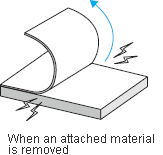|
|
Static buildup is the phenomenon wherein electric charges are exchanged between the surfaces of two objects that come into contact with each other.
In this process, one object takes on a positive charge and the other a negative charge.
It is because of this that static electricity builds up on the surface of objects.
Static buildup consists of the following three major types.
This is the static buildup that occurs when two objects come into contact with each other and electrons are transferred from one object to the other.
The transition of this charge is almost complete the instant contact is made.
Contact static buildup is the main cause of static electricity generated by contact and detachment.


This is the static buildup created when friction occurs between two objects.
The principle behind this occurrence of static electricity is the same as that for contact static buildup.
However, as the area of contact is larger, the amount of static electricity generated is greater than the amount produced by contact static build up.
Additionally, because the contact surface area increases as more force is applied, the amount of static electricity tends to increase.

This is the static buildup that occurs when items like adhesive tape and protective film are removed.
As with frictional static buildup, the principle behind this kind of static electricity is the same as that for contact static buildup.
The tape or film is in very close contact with the object so the effective contact surface is large. The amount of static electricity generated is overwhelmingly greater than that of contact static buildup.